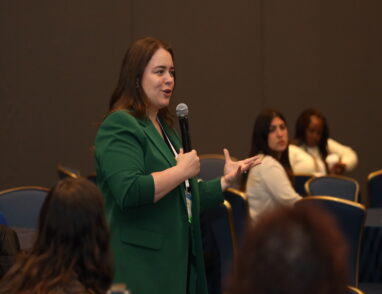Susannah Fox: Listen for the Unexpected Voices in Health Care
November 25, 2024 · Becky Kolinski
Susannah Fox, author and strategist, delivered the closing keynote at the Health Innovation Summit. Her message: We need to involve patients, survivors and caregivers in building solutions that can help them.
For many people, there’s a gap between what they hope will happen if they are sick or injured, and what actually happens. If mainstream health care cannot meet their needs, patients—and those who care for them—band together to innovate a solution. A patient-led revolution highlights opportunities for improved safety, efficacy and new products and services.
Fox has seen the patient-led revolution in action, and she predicts that it will continue to grow as people gain access to their health data.
A New Model for Identifying Gaps in Health Care
In her book, Rebel Health: A Field Guide to the Patient-Led Revolution in Medical Care, Fox develops a new visualization of the gaps in the US health care system.
The horizontal line represents the spectrum of people’s needs that are met by mainstream health care. The vertical line represents the degree to which people are visible to mainstream health care. On the right are people whose needs are met: They have a diagnosis and access to treatment that works for them. On the left are people whose needs are not met: They may not have a diagnosis—or they don’t understand their diagnosis—or they don’t have access to treatment that could work for them.

“Invisible” is code for ignored. The yellow area on the diagram represents what Fox refers to as the “quadrant of suffering.” She says we can learn from the people there.
A History of Peer-Led Innovation
People whose needs are not met by mainstream health care have often turned to each other for support. Fox shared three examples of radical health movements in the US.
- Alcoholics Anonymous. In 1935, in Akron, Ohio, two people struggling with alcoholism had nowhere to turn for help—so they turned to each other. They formed Alcoholics Anonymous as a peer-to-peer mentoring group to guide people to sobriety, one day at a time. Now, peer-led support is part of mainstream substance use disorder recovery.
- Sickle Cell Anemia Disease Registry. In 1971, the Black Panther Party recognized that mainstream health care was not tracking the prevalence of sickle cell anemia—a disease that mostly affects people of African descent. The party used its network of community health centers and volunteers to test the Black community for sickle cell genetic markers, created the first data repository in the US for the disease—and helped win congressional funding for sickle cell anemia research.
- The ACT UP Movement. AIDS was sweeping the world in the late 1980s and the 1990s. Because the disease first emerged among gay men, it was stigmatized and research was underfunded. The gay community formed grassroot, peer-led coalitions, staging protests and civil disobedience to raise awareness and demand government acknowledgment and funding for research and treatment.
We can learn from the pioneers on the frontiers of health care. How people react to a new diagnosis or health challenge can be a model for change on a larger scale. Their ideas and inventions can shift the paradigm of what’s possible.
People You Meet in the Revolution
- Seekers sense that something is not right with their health. If their questions are not being answered to their satisfaction, they search for answers. They get to work, and don’t give up.
- Networkers gather people together to learn from each other. They know that connection is an antidote to suffering and confusion. Networkers can get the word out to encourage others to stand up as a community.
- Solvers often have a singular focus because their life, or the life of a loved one, depends on their ability to solve a problem. They identify challenges, then develop new concepts or inventions to meet their needs. Solvers push boundaries, and aren’t afraid to break rules.
- Champions take new ideas and bring them to scale. They fast-track innovation, seizing opportunities that other people might have missed to unlock funding, regulatory guidance or access to labs and manufacturing facilities.
Each type has a role in the revolution that is amplified when they connect with each other—seekers with networkers, solvers with champions—to share information, innovate and move their agenda forward.
Join the Revolution
As patients, survivors and caregivers, we need to bring our community together, collect data and demand access to research and funding. As health care professionals, we need to listen for the unexpected voices in health care and learn from them. Remember, what seems radical today is likely to become mainstream practice tomorrow.
Learn more about these ideas in Rebel Health: A Field Guide to the Patient-Led Revolution in Medical Care.








